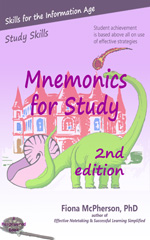- Images are effective to the extent that they link information.
- Images are not inherently superior to words.
- Bizarre images are not necessarily recalled better than common images.
- Imagery is chiefly effective when used with an organizing structure.
Most mnemonic strategies are based on imagery. There is no doubt that imagery can be an effective tool, but there is nothing particularly special about imagery. The advantage of imagery is that it provides an easy way of connecting information that is not otherwise readily connected. However, providing verbal links can be equally effective.
The critical element is that words or images provide a context which links the information. Thus, imagery is only effective when it is an interactive image — one which ties together one bit of information with another.
Visual imagery on its own is of limited value without an organizing structure, such as the method of loci or the pegword method (see list-learning mnemonics).
It is usually emphasized that bizarre images are remembered much better, but there is no evidence for this. In many studies indeed, ordinary images are remembered slightly better. One of the problems is that people tend usually find it harder to create bizarre images. Unless you have a natural talent for thinking up bizarre images, it is probably not worth bothering about.
Further reading:
for a long, scholarly article on mental imagery, you can see the entry in the Stanford Encyclopedia of Philosophy at:
- Belleza, F.S. 1983. Mnemonic-device instruction with adults. In Pressley, M. & Levin, J.R. (eds.) Cognitive strategy research: Psychological foundations. New York: Springer-Verlag.
- Bower, G.H. 1972. Mental imagery and associative learning. In L.W. Gregg (ed.) Cognition in learning and memory. New York: Wiley.
- Morris, P.E. 1978. Sense and nonsense in traditional mnemonics. In M.M. Gruneberg, P.E. Morris & R.N. Sykes (eds.) Practical aspects of memory. London: Academic Press.
